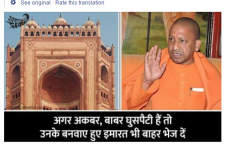A belligerent group of women stormed the offices of the District Magistrate in Mahoba district on the 15th of April. Their demand: that the stone crushing machines, specifically, that of one ‘Swami Raj Crusher’ be shut down or regulated. The white dust hanging constantly in the air as a result of the stone crushing machines, they claimed, was detrimental to their lives and that of their children.
In February 2016, while investigating the death of a labourer in a quarry in Kabrai, we stumbled on the cascading impact of this life threatening livelihood. The conditions of work on these often illegal and unregulated sites were shocking. When accidents occurred, which they did at a horrifying frequency, bodies were removed from quarries and made to disappear; the nexus of police, contractors and quarry owners set the price of bodies and families must accept without much of a murmur, or lose their means of livelihood as well as the security of their lives. Wages were regularly withheld. Still, for landless labour in this region, this was as good a bet as they were going to get to feed themselves and their families. The price of a day’s work, it must be added, was almost double that offered by the rural employment guarantee scheme, MNREGA, and, ironically, much more dependable. So what if you may lose a few limbs, or your life?
The current petition carried by women, the worse affected in this region, responds to the fact that the 200 stone crushing machines in just one, Kabrai block of Mahoba had pushed them, their immediate families, and generations into illness. We visited some of these women’s homes along the edge of the quarry and saw the layer of dust on their grains, heard complaints of the dust never quite washing out of food, grains, hair, throat, eyes. ‘Now we’re just used to it;’ ‘You’re here, so the machines have gone off. Otherwise we can’t hear ourselves,’ they raged. Women who were angry, cynical, at the end of their tether.
Sunaina, who lives in Kabrai, tells us, ‘The machine runs all the time, all day, all night. You wake up in the morning and look at yourself in the mirror, and your face is covered in dust!’ An older Paana, less inclined to see the humour in the situation, said, ‘It’s been cold till now, so you could stay indoors. Now what? However you try and cover things, food, it gets everywhere. My husband died like this, in this dust, and now I’m sick, my children are sick all the time.’
The petition is an angry culmination of years of complaints and protests – ‘We’ve been to Mahoba, Banda, Lucknow – to Mayawati! Nothing has happened,’ says a dramatic Radha Yadav. ‘It’s since 2004 that we’ve had this problem. It was the time of the BSP government. We went to Lucknow with a complaint when they set up these machines, that we had a problem with them. Our files ended up in the hands of some BSP workers who were from here, and who own quarries here. So no one listened to our complaints. On the contrary, my husband was threatened, that if he ever complained again, he would be shot.’
The petition to the DM, Ajay Kumar, asked that crusher machine owners be obliged to follow rules about spraying water to settle the crusher dust, and requested the CMO to organize health checkups in Kabrai. Subsequently, a camp was held on the 16th of April.
But some women, like Kunti, were clear they wanted no sprinklers, only the machines to be removed.

